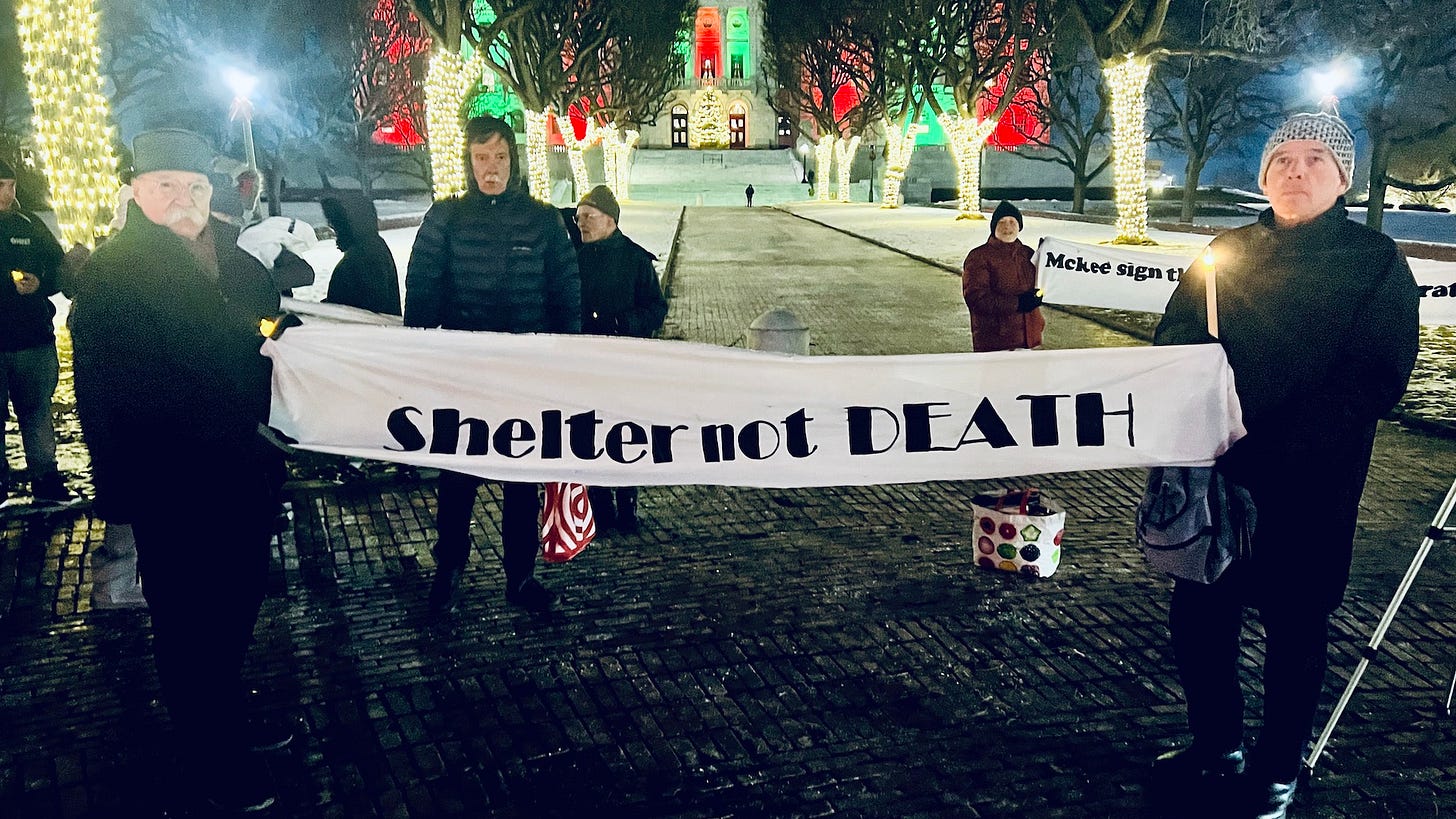Providers are working without contracts, emergency hubs are not yet funded, and key members of the Housing Department are on vacation
“Is it appropriate to be on vacation while people are dying on the streets of Rhode Island?”
I sent the following email to David Schnell, who works for the Rhode Island Emergency Management Agency (EMA) but is currently on loan to Rhode Island Housing as the Winter Readiness Project Manager.
“I am wondering about the current state of the warming shelters in Rhode Island.
“As I understand it, warming centers are mandated to open only when the temperature or the wind chill reaches 0 degrees, [and municipalities have the option of opening outside that temperature range if they so choose.] I wonder why that temperature range was chosen, as people can certainly die from exposure at much higher temperatures than 0 degrees.
“Also, it is my understanding that contracts in many municipalities have not been finalized and that final procedures are also awaiting finalization from the EMA. Given that people are already dying outside, what is the explanation for this delay?”
In response, I received the following:
David Schnell is not the only Rhode Island State Government official enjoying a warm holiday with family and friends. Acting Housing Secretary Deborah Goddard is also not working this week, even though she assumed the job around a month ago.
And not to put too fine a point on this, but people are suffering and dying outside in Rhode Island. As recounted at a recent Vigil outside the State House a week ago, a homeless person named R.J. died while sleeping overnight in a trailer. R.J. was described by Kevin Simon, Pastor at Mathewson Street Church, as a “dear friend.”
I’ll end this with the question I sent to David Schnell and communicated to Acting Secretary Goddard through her staff. “Is it appropriate to be on vacation while people are dying on the streets of Rhode Island?”
To understand the issue, you need to understand broadly how the State of Rhode Island delivers services to people experiencing homelessness. The State provides very little in the way of direct services. Instead, the State contracts with service providers, such as Better Lives Rhode Island, House of Hope CDC, Crossroads, Amos House, and others. Currently, around 90 contracts are unsigned - meaning that providers are working and supplying services to vulnerable Rhode Islanders out of pocket, with no guarantee of recompense, merely a promised contract. When contracts are finalized, these service contractors may be made whole - but in the short term, many struggle to make payroll or deliver services.
Please note that service providers have not helped with my research into this story. I cannot definitively speak for them, but I suspect their motive for not being more public about this may be fear of retaliation: These agencies need these contracts to survive, and it is not wise to bite the hand that feeds you.
David Schnell
David Schnell spoke at the newly reconvened Interagency Council on Homelessness on December 21st. His vacation started after that date:
“I want to talk to you about the Municipal Homeless Support Initiative today. This is a [State] funded source for municipal agencies to expand or host new winter readiness hubs. The second part was to assist the municipalities with public safety or municipal expenses such as school, transportation, and other services to help the homeless.
“We put out a funding opportunity in September and October of 2024. At that point, there were two different segments. The first was a competitive grant of $350,000 for new overnight shelters and expanded capacity in existing shelters for extreme weather. The second part was the Winter Emergency Hub competitive branch, which supports new hubs in response to weather protocols. There was approximately $524,000 available in that.
“We received six applicants, and six tentative award letters were sent out last week. I’ll discuss which municipalities received them. Under the competitive grant, Burrillville requested $75,000 for school transportation costs to maintain their shelter capacity at Zambarano.
“In Woonsocket, they want to maintain and expand their shelter capacity, and they got an award of just over $77,000. Westerly intends to expand its current shelter capacity by working with other providers, and its award was $176,469.
“For the second part of the grant, Woonsocket also received a $376,000 grant for Winter Hub activations, while West Warwick’s totaled $37,518. We’re investigating a best practice where the Town of West Warwick emergency manager opens the West Warwick Civic Center on very cold nights. I believe he did this one-night last week and again last year.
“Similarly, Newport’s Fire Chief, the emergency manager, is working with a few providers to provide almost $66,000 for winter hub activations. Regarding the allocated amounts, we came short of that, so that was good. We were under budget.
“Now, we’re working on contract language. We will send out the contracts, [providers] will sign them, and we’ll get them back. The secretary will sign them, and we’ll have an executed agreement to move forward. When the contracts are signed and executed, we can start invoicing for the project costs.”
Here’s the discussion that followed Schnell’s presentation:




It’s as if homeless is a detached concept from their consciousness and not a reality. I don’t know if that’s some cognitive deficit or a moral one.
Don't these folks know that it is winter already!! They seem to have no sense of urgency about solving this crisis. Contracts should have been signed , emergency hubs should have been dentified and funded, and plans should have been made before winter!